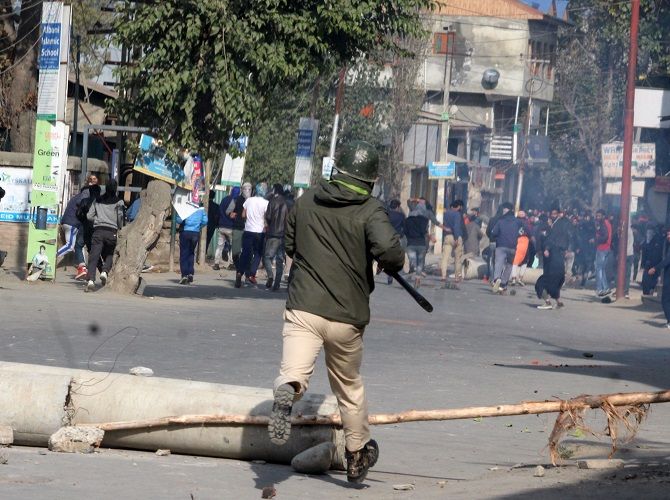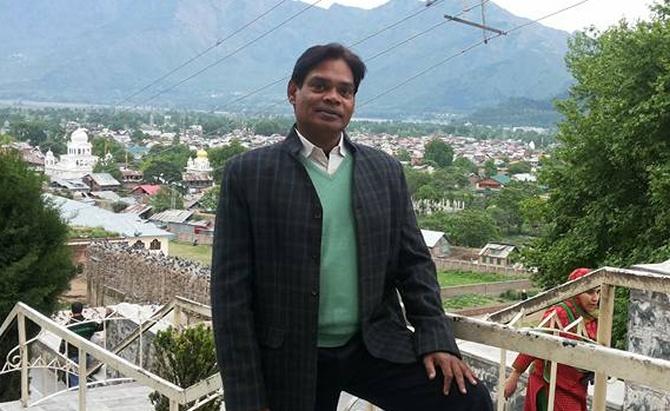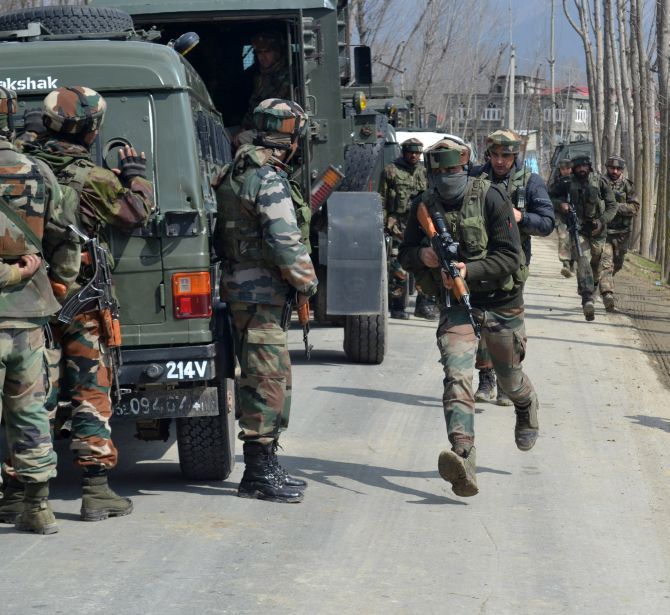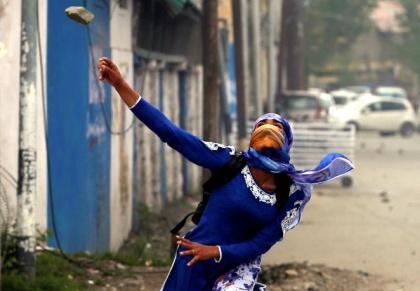'...by stopping its promotion of turmoil, its aid and abetment to militancy.'
'Mr Vajpayee paved the road for peace by engaging Pakistan tirelessly while also reaching out to Kashmiri leaders and people at large.'
'Like so often in the past, this government does not have a policy. No consistency in approach.'

IMAGE: Security forces and Kashmiri youth clash near a house where terrorists had sought shelter in Nowgam, Srinagar, October 24, 2018.
Photograph: Umar Ganie for Rediff.comA chain, it is said, is only as strong as its weakest link, and what holds true for chains applies to nations, too.
A nation is only as strong as its weakest component -- and in India's case, the weak link clearly is Kashmir, the handling of which, at the best of times, seems like an impossible task.
That elected governments are seldom in tune with the aspirations of those who elect them is a truism about democracy. But in the case of Kashmir, what complicates matters is geography confounded by history that is marred by politics.
Such is the attitudes all around on the sensitive border state that peace in the volatile Kashmir valley refers now merely to the absence of violence.
Thus, a few days of incident-free life in the valley is taken as an affirmation of the political process, even when the facts are to the contrary -- like the abysmal turnout in the recent local body elections.
For longstanding Kashmir watchers like David Devadas, the situation can be extremely frustrating. But unlike many observers on the region, Devadas has spent more time in Kashmir than elsewhere and thus knows the people's daily concerns as well as is a witness to the changing strands of what is euphemistically called the Kashmir problem.
His latest book, The Generation of Rage is Kashmir, is a must read for everyone concerned about the state's future, especially the policy-makers who have often been blindsided by the twists and turns in the agitation.
The book is first and foremost a reporter's work -- Devadas is a veteran journalist, and this book offers an insight as much into his working process as it is a reflection of the true situation on the ground -- and does what a reporter is ingrained to do: Let the voices tell their own story.
And it is a story that is grim and worrisome for those for who put the nation above all, but especially to those who call the shots for it is in their power to rectify the situation.
"I fear that the direction in which many young people in Kashmir are going may lead them to reject any nation-State system, not just the Indian Constitution," David Devadas, below, tells Saisuresh Sivaswamy/Rediff.com.
What is this rage that powers the Kashmiri Muslim youth? Is a real propitiation of this anger possible within the existing contours of India, within the confines of the Indian Constitution?
For the most part, this anger is now too far gone to be easily reversed; it will play out.
In July, though, there was a new discourse in south Kashmir about the futility of deaths. But like so many times before, that sentiment was not given time and space to grow.
I fear that the direction in which many young people are going may lead them to reject any nation-State system, not just the Indian Constitution.
41 security men killed, 907 injured in militancy-related, stone-pelting incidents in Kashmir between January and June 2018. Do these deaths justify the rage of the Kashmiri on the street? In any other country, civilians pelting stones on security forces during an encounter with terrorists, would be shot, no questions asked, isn't it?
Of course they don't justify the rage. My concern is that, like so often in the past, the government does not have a policy. No consistency in approach.
You mention that the period around 2007 as a time of great potential, for genuine peace. The fact that the chance was not seized, best illustrates that at the best of times, given the best of intentions, Kashmir remains a nettle that needs careful handling.
That's always true, Sai, but what the failure to build on opportunity proves is the blindness and inadequacy of the State apparatus.

IMAGE: Sepoy Rajendra Singh who died at a hospital in Srinagar, October 26, 2018 after he sustained head injuries during stone-pelting by a group of Kashmiri youth the previous evening.
Could one say that Indian policy-makers are hamstrung by the fact that any concession on Kashmir, without a solid quid pro quo from the agitationists, will be hard to sell both to Parliament and to the Indian population?
I think they are hamstrung by their blindness and lack of understanding or policy.
Can a solution to the Kashmir problem be possible without the return of the Kashmiri Pandit refugees to their homes? The government has been asking them to return, but those who have find a changed Kashmir that does not want them anymore. Is 'Kashmiriyat' a mirage, then?
I have discussed 'Kashmiriyat' in my previous book as, at best, an ambivalent feature.
For the most part, the children of migrants have moved on. The demography, and the socioeconomic set-up, has changed. Two-thirds of the valley's current population has never seen Pandits around them.
This also leads to the question. Why is that Kashmiri Pandits, who have seen their lives disintegrate after being driven out of their homes and who have as much reason to be angry, have not given into their rage like their counterparts in the valley?
That surely is a rich subject for another book. Indeed, a tremendous book could be written about the cultural flux in the Pandit community. This book is only about the rage that has developed among young people currently in the valley over the past decade.

IMAGE: David Devadas, journalist, author. Photograph: Kind courtesy David Devadas/Facebook
Would you say in the valley, Islam is a greater unifier than Kashmiriyat?
For many Kashmiri Muslims, the two identities are inextricably inter-twined. And as I mentioned, Kashmiriyat was always an ambivalent feature of Kashmiri society.
In any case, religion has become a far more important marker of identity than it was about 50 years ago -- just about everywhere.
How critical to peace in Kashmir is Pakistan? Can peace be possible without involving Islamabad? I ask because successive Indian governments have stated that there is no room for a third party in a bilateral dispute.
Pakistan can certainly contribute to peace by stopping its promotion of turmoil, its aid and abetment to militancy. Mr Vajpayee paved the road for peace by engaging Pakistan tirelessly while also reaching out to Kashmiri leaders and people at large. He had an understanding of the complexities of the situation.

Photograph: Umar Ganie for Rediff.com
Since you have been seen both from up close, is there a difference in how the United Progressive Alliance handled Kashmir, and how the National Democratic Alliance handles it?
Broadly speaking, Mr Vajpayee was amazing. After that, both have made huge mistakes.
What do you think has brought about the new tactic, of targeting SPOs, policemen's families? Do these attacks reflect the popular view in the valley, where often it's the local police that is the first touch point for Kashmiris?
The game plan has been obvious for some time. Burhan Wani publicly warned about it in the summer of 2015. The opponents of the government have been building up towards targeting the police, but the government ignored it for a long time.
India is the midst of an election year. That also means no government can afford to be seen as conceding to demands, especially one that is backed by street power, or popular rage. Where does that leave Kashmir for now?
At least until the elections, the country will try to ignore it as things get worse. Not a good scenario.
















